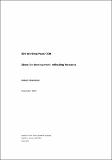| dc.contributor.author | Chambers, Robert | |
| dc.date.accessioned | 2011-04-12T14:10:36Z | |
| dc.date.available | 2011-04-12T14:10:36Z | |
| dc.date.issued | 2004-11 | |
| dc.identifier.citation | Chambers, R. (2004) Ideas for development: reflecting forwards, IDS Working paper 238, Brighton: IDS | en_GB |
| dc.identifier.isbn | 978 1 85864 848 3 | |
| dc.identifier.uri | https://opendocs.ids.ac.uk/opendocs/handle/20.500.12413/669 | |
| dc.description.abstract | Part 1 (1997): If development means good change, questions arise about what is good, and what sorts of
change matter. Answers can be personally defined and redefined. The changing words, meanings and
concepts of development discourse both reflect and influence what is done. The realities of the powerful
tend to dominate. Drawing on experience with participatory approaches and methods which enable poor
and marginalised people to express their realities, responsible well-being is proposed as a central concept
for a development agenda. This links with capabilities and livelihoods, and is based on equity and
sustainability as principles. The primacy of personal actions and non-actions in development points to the
need for a pedagogy for the non-oppressed. This includes self-critical awareness, thinking through the
effects of actions, and enabling those with power and wealth to experience being better off with less.
Others are invited and encouraged to reflect, improve on this analysis, and write their own agenda. Part 2 (2004): Since 1997, the polarisation of power and wealth in the world has become even more
extreme. The personal dimension is central in mediating every big issue but continues to be relatively
neglected. Words and concepts used in development have remained potent. Social capital and sustainable
livelihoods have met needs in powerful organisations and have been widely adopted and influential.
Responsible well-being, pointing to individual agency, has languished at the same time as the scope for
action and impact has been enhanced by growing interconnectedness. The methodologies proposed earlier
are needed more than ever. So are new lines of thinking: to complement rights of the poorer and weaker
with obligations of the richer and more powerful, worldwide and between all levels; to recognise power
and relationships as central issues; to integrate institutional and personal change; to ground pro-poor
policies and practice in realism; to think for oneself and take responsibility; to choose words and identify
priorities personally; and to seek guidance by reflecting on what a poor person would wish one to do. | en_GB |
| dc.language.iso | en | en_GB |
| dc.publisher | Institute of Development Studies (UK) | en_GB |
| dc.relation.ispartofseries | IDS Working Paper;238 | |
| dc.rights.uri | http://opendocs.ids.ac.uk/opendocs/handle/123456789/80 | |
| dc.subject | Participation | en_GB |
| dc.title | Ideas for development: reflecting forwards | en_GB |
| dc.type | Series paper (IDS) | en_GB |
| dc.rights.holder | Institute of Development Studies | en_GB |
| dc.identifier.externaluri | http://www.ntd.co.uk/idsbookshop/details.asp?id=846 | en_GB |
| dc.identifier.blds | 245106 | |

